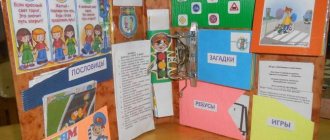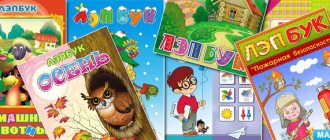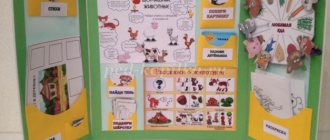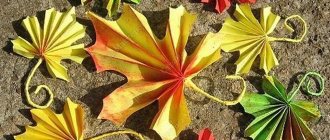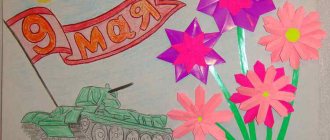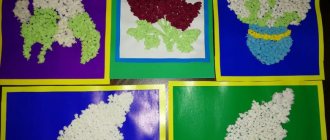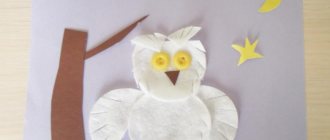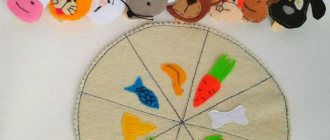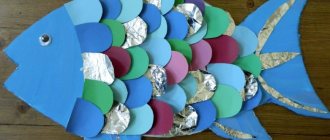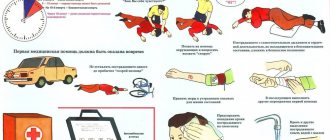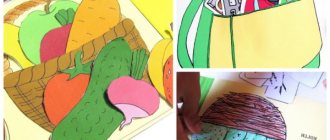Lapbooks will help you visually and playfully demonstrate to children the eternal harmony of the smooth transition of the seasons into each other. You can easily and quickly find here hundreds of useful ideas for creating lapbooks with manuals, cards and games on the seasonal changes of nature.
Reveal to your children the unique charm of each season with ready-made MAAM lapbooks!
Below are publications by teachers with photographs of homemade seasonal lapbooks used in classes with children of preschool and primary school age.
What is a lapbook?
The laptop is the latest invention for child development.
Translated from English it means “knee book”. The device is actively being introduced into the educational process for preschoolers and primary schoolchildren. In addition, the lapbook is very easy to make and is suitable for playing at home. This homemade mini book allows your child to quickly absorb the necessary material, consolidating acquired skills by rearranging, comparing, or searching for various details.
History of origin
For the first time, a similar folder was introduced into classes by a writer from Virginia, Temmie Dubey. She used the mini book to organize learning material for her children. The laptop is small in size and large in capacity.
The author of the invention improved the experience of Dina Zayk, who used folded sheets of paper with interactive tasks to teach children. Temmie placed various themed games in one folder, which made the process of learning the material more fun.
On a note! In Russia, a mathematics teacher was the first to start making laptops. Tatyana Pirozhenko is from Simferopol. She is a mother of 2 children and in her free time she develops new types of kneeling books, which are rapidly gaining popularity.
What is it needed for
This method of training is used for:
- Organization of a child’s cognitive activity.
- Interactions between adults and children.
- Development of attention.
- Formation of perseverance.
- Activation of the thought process.
- Development of creative abilities and imagination.
- Accustoming your baby to collective exercises.
- Formation of correct pronunciation and writing.
Important! The main task of a lapbook is to promote the intellectual enrichment of the child with subsequent memorization of the information already received.
Advantages of using knee books:
- Help in systematizing acquired skills.
- A convenient method for repeating covered material and better memorization thanks to associative thinking.
- The child learns to independently conduct analysis in a playful way.
- The kneeling book is suitable for exercises in kindergartens, schools and at home.
- The ability to produce various thematic contents inside the folder, selecting material based on the child’s abilities and previously acquired skills (individual approach).
Another important advantage is the simplicity and speed of making a lapbook. Even a child can do some types of interactive exercises without much time. A mini book can be made by teamwork or independently.
Kinds
There are a huge number of different lapbooks. They are usually divided into the following groups:
- Encyclopedic. The simplest type of mini folder. All the necessary information is in the encyclopedia. The main task is to distribute it correctly. It is enough to place 5-6 interactive tasks on a specific topic (water, space, animal, etc.). Such activities are suitable for school-age children.
- Plot. They are created based on your favorite books or cartoons. Often, after watching a cartoon, a child wants to play the plot over and over again, but watching it is no longer interesting. Invite him to create his own “world” with his favorite characters. Music folders with theater elements are also used for training.
- Thematic. They involve the introduction of various educational subjects with game elements into the lesson. Suitable for children in the middle and preparatory groups of kindergarten. With their help you can study:
- Seasons (autumn, winter, summer, spring).
- Animals.
- Vegetables and fruits.
- Constitution of man.
- Professions.
- Nature.
- Clock, etc.
Educators often develop laptops based on fairy tales to develop a child’s speech.
School
They are divided by subjects (mathematics, Russian language, ecology, fire safety, life safety, physics, chemistry). For each discipline, you can choose a specific topic for teaching your child.
Congratulations
Such folders are used as gifts for holidays (New Year, Birthday, Easter). Create a holiday mini book with your little one. Let him lead the process and make his wishes.
You can also invite your child to create an autobiographical story using a lapbook. Such kneeling books are usually made by the child himself. Photographs, pictures with wishes for the future, dreams, goals, etc. are attached to the base.
Choosing a theme
It all depends on what the child needs to learn about. Standard options include seasons, studying trees, numbers, letters, insects, wildlife, etc. A small book will contain a small educational part and a training part to consolidate knowledge. By making a lapbook yourself, you can make an individual guide that would be suitable for consolidating gaps in knowledge.
A full-fledged study is suitable for the 3-5 year old category, when children perceive interactivity positively and are at the age of “why”. On the Internet you can find a huge number of ready-made templates that are created by real professionals.
Even if nothing comes to mind, you can simply print and assemble a full-fledged book within a few hours.
Materials for creating a lapbook with your own hands
To do this you will need the following materials:
- base cardboard (cardboard folder or sheet of thick A3 paper);
- paper (white, colored, scrapbooking paper with various colors and textures);
- printer and/or pens, pencils, markers, paints;
- regular and curly scissors;
- glue and/or tape;
- stapler;
- decorative elements as needed (buttons, sequins, brads, pendants, paper clips, dried leaves, stickers, themed pictures cut out from magazines, etc.)
What to make from
When starting to create an educational didactic paper lapbook, prepare the following materials:
- Cardboard folder. Buy it or make it yourself from whatman paper.
- Colored paper, cardboard, foamiran, various pieces of fabric.
- Scissors, glue.
- Scotch tape, stapler, thread.
- Cards, pictures, images of animals, people, etc. Cut them out, draw them, or print them on a color printer.
- Pencils, paints, felt-tip pens, markers.
Layout
The next stage is drawing the layout (what the laptop will look like). To do this, immediately fold your folder so that it then opens, unfolds, and with a simple pencil sketch out the places where there will be pockets, books, pictures, in what form and size all this will be presented. Next, you just have to glue all the parts and attach them to the workpiece.
Ideas
It is possible to diversify your interactive “knee book” and make it more interesting thanks to different ideas for the original creation of thematic zones. For example, use envelopes of different sizes and shapes, you can take CD packaging or make them yourself. Accordion books, cut notebooks, divider cards and opening windows look very unusual. However, what children love most is the rotating parts and the parts with multiple openings.
How to do it step by step
So, detailed step-by-step instructions for creating a paper interactive folder are as follows:
- Decide on a topic.
- Prepare a layout and all necessary materials.
- Next you need to make pockets for a laptop, envelopes, books, accordions, cards, images, figures, etc.
- Glue the blanks to the layout according to the planned plan.
Educational lapbook
The laptop encyclopedia will be useful for older preschoolers for individual work. In fact, this is a full-fledged form of training and consolidation of information, so content and content are in the foreground. Use blocks with interesting facts, cards with illustrations, tests, quizzes, riddles, questions and answers, quizzes, puzzles and match-up games.
Gaming laptop
These lapbooks are more of a toy than an encyclopedia, so focus on the entertaining elements. Let all the information be as light as possible - in jokes, riddles or poems. Choose more volumetric parts, movable windows, sliding pockets and rotating circles.
Use puzzles, simple adventure games, task cards, small objects in fabric bags and all kinds of guessing games. Make a lapbook with proverbs, poems, tests, pictures and meanings to match. An interesting task is to compose a story based on a picture or put the frames in order.
Holiday lapbook
A congratulatory lapbook is a wonderful gift for a person whose tastes and interests you know. A themed album with inserts, pictures, photographs, memorable trinkets and cute decorations will delight even adults. You can also make it with your child as a gift for his friends: for example, with dresses and accessories for a friend’s paper doll or with a friend’s favorite cars and athletes.
Lapbook story
Another lapbook that you can make with your own hands not only for a child, but also with him - the story of his life. Let the baby decide for himself what he wants to put in the secret pockets. Make sections with photographs, funny phrases, small crafts. Such an album will be an excellent memory for the whole family in 10 or 20 years.
Lapbook for a small child
Initially, lapbooks were used by teachers to prepare children for school, but children under 5 years old can also play with such albums and explore the world. Just select the content according to age: instead of cards with facts, introduce the baby to colors, shapes, textures and simple moving elements.
Lapbook “about life”
All parents are concerned about how to teach their child not the most interesting, but vitally important things. These are the rules of the road, what to do if you get lost, how to communicate with strangers and how to act in other emergency situations. This is exactly what a lapbook with beautiful pictures, interesting quizzes and humorous poems is ideal for.
Animals
A didactic manual about animals tells about specific representatives of this class. When compiling such a lapbook, make sure you have the following elements:
- photo of the animal;
- map with habitats;
- pocket with a picture puzzle;
- a rotating circle depicting the food consumed by the animal being studied;
- mini-book with interesting facts;
- a strip where you can enter the status of the animal in the Red Book;
- envelope with coloring book;
- chamomile with riddles and proverbs on the petals.
On speech development
A laptop for speech development is aimed at eliminating problems in this area in children: pronouncing sounds correctly, composing sentences and short stories using prepositions, being able to understand the meaning of poems, and retelling them. When compiling such a lapbook, use:
- sayings, counting rhymes, riddles;
- poems, parables, stories;
- cards with letters, words;
- coloring books;
- pictures for their oral description;
- envelopes with tasks: name the word, say it kindly, find the difference, etc.
About school
Such topics should contain information about this institution, rules of behavior in it, interaction with other children, teachers, etc. Use the following ideas to create your own book folder:
- A backpack-style pocket and an envelope with small images of school supplies. Invite your child to play the game “Collect a briefcase.”
- Image of a school with opening windows, door.
- Pocket with textbooks (in pictures).
- Envelope with riddles about school.
- A little book with rules of behavior.
- Cards containing the rules of interaction between children and the teacher.
Plan
After the topic has been chosen, it is necessary to draw up a plan on the basis of which the manual will be created. Its presence will save time and resources. As an example, we can take the topic “September 1”:
- Introduction to school concepts - bell, history, various terminology.
- Rules of school life - what is discipline, etc.
- Safe return home.
- What's included in the briefcase?
- Speech development - proverbs.
- Maintaining interest - interactive calendar.
This theme is ideal for those who are looking forward to their first trip to school. This event is very exciting for the baby; saturation with knowledge will give him self-confidence. Naturally, you can choose any topic, and then make a personal plan. You can learn how to properly make a lapbook with your own hands in the following sections.
Description of the procedure for compiling a lapbook “Seasons”
Let us dwell on the intricacies of creating a manual for preschoolers of middle and older age.
For the cover you can choose a picture depicting the main signs and symbols of each season
Materials and tools:
- 4 sheets of thick cardboard (can be from packaging of household appliances);
- self-adhesive in blue, yellow, green and red colors;
- scissors;
- hole puncher;
- ring holder for a binder (you can use rings with a cut - “jump rings” used in jewelry);
- colored cardboard for pockets and envelopes;
- pictures for designing the manual and printed names of pockets and envelopes.
Instructions:
- We trim the sheets so that they are of the same format.
- We paste one sheet on both sides with blue paper, and one sheet, also on both sides, with red paper. We paste the next sheet with blue paper on one side and yellow paper on the other, then make one side of the next sheet of cardboard yellow, the other green, then one side green, the other red.
- We assemble the pages so that the spread is one color, the cover pages are blue and red.
Each spread dedicated to a specific time of year has its own color.
We pierce the pages with a hole punch and insert rings.
We design the blue spread to match the winter theme. We make the pockets blue, for the game materials we make a snowman whose circles are accordion books with the rules of these games.
“Winter” pages can be decorated with decorative snowflakes
We decorate the yellow spread with envelopes and pockets.
For a “spring” spread, the pockets can be in the shape of flowers
On the summer spread we place envelopes in the shape of flowers, “doors” with a fairy tale and pockets with plot pictures.
Curly envelopes in the form of flowers are also used in the design of the “summer” spread
We begin to design the autumn spread, placing “accordions” and pockets there.
Thematic pictures about autumn can be made in small format and glued to a background in the form of droplets
Materials for the manual “Seasons”
Usually thematic lapbooks are compiled for all seasons separately, so this particular guide is in the nature of a generalization of the main signs of each season.
Block with text information
This section includes:
- general signs of each season;
- information about the months, their alternation, possibly with poems suitable for each month;
- a list of interesting folk signs for each season;
- fun facts for every season.
Block with poems and riddles
For children 3–4 years old, a block of poetry can be compiled based on the selection proposed here.
For older children, the selection can include poems by Russian classics. Moreover, they can be grouped by seasons and months.
As for riddles, when compiling the “Seasons” lapbook, the same rules apply as when developing manuals on other topics:
- riddles are included in the lapbook from the second youngest group;
- for children 3–4 years old, riddles should have rhyming answers.
For example, for kids the selection could be like this:
- I have a lot to do: I cover the whole earth with a white blanket, I whiten the fields, houses, My name is... (winter);
- I am made of heat. I carry the warmth with me. I warm the rivers, I invite you to swim. And you all love me for this. I... (summer);
- I open the buds, I dress the trees in green leaves. I water the crops, there is a lot of movement. My name is... (spring);
- I bring the harvests, I sow the fields again, I send the birds to the south, I strip the trees, But I don’t touch the pines and fir trees. I... (autumn).
For children in the middle and older groups, riddles can be more difficult to choose, for example, to illustrate each season:
- winters - They didn’t raise me - they made me out of snow. Instead of a nose, they cleverly inserted a carrot. Eyes are coals, hands are knots. Cold, big, who am I? (Snow Woman);
- spring - A beauty walks, touches the ground lightly, walks to the field, to the river, and on the snow and on the flower. (Spring);
- summer - the sun is shining, the linden tree is blooming. The rye ripens, when does this happen? (Summer);
- autumn - coins are falling from the trees from heavy rain and wind. I'll pick up ten coins and make a big bouquet. (Autumn leaves).
Block with themed games
This block is represented by tasks of different types of games.
Table: selection of games for the “Seasons” lapbook
| What is the name of the game | How to play it | What age children is it addressed to? |
| Didactic games | ||
| “What’s out of season?” | The teacher names the season and shows a picture of clothes. If the outfit is in season, the children clap, and if it is not in season, then they stomp. | For younger preschool age |
| "When it happens" | Children take one large picture depicting the season. The teacher shows one small one, the children determine when this happens. The winner is the one who collects four small pictures for his season faster. For older preschoolers, you can complicate the task: using the collected pictures, children make up a story. | For middle preschool age |
| "Collect a picture" | The guys put together pictures from the elements. | |
| Outdoor games | ||
| “Birds and Chicks” (with elements of imitation) |
| For younger, middle |
| "Snow Woman" |
| For middle and seniors |
| "Catch a mosquito" |
| For anyone |
| Finger game | ||
| "Months" | Winter months: December, January Let’s not forget to add February to them (arms are placed to the sides, imitating the fall of snowflakes) For spring we give March, April, warm May (arms raised above the head, imitating a light breeze) For summer - June, July, August, come on (hands in front of us, palms pressed to each other, imitating the “fish swims” movement) And if autumn comes to visit us, September, October, November will bring! (we imitate picking berries in a basket) | For younger preschoolers |
Sources
- https://rechudetey.ru/razvivayushhie-igry/lyepbuk.html
- https://nitforyou.com/lepbuk/
- https://sovets.net/15664-lepbuk.html
- https://lafoy.ru/lepbuk-svoimi-rukami-10-idey-501
- https://melkie.net/podborki/lepbuk-vremena-goda.html
Master Class. Album "Seasons" for the little ones
Tatyana Safronova
Master class. Album "Seasons" for the little ones
I want to share with you my experience in creating the album “Seasons” for the little ones.
Throughout the year, the kids and I made crafts on the themes: “Summer”, “Autumn”, “Winter”, “Spring”. You can read about each of these works in detail on my blog. We got four jobs. So, we decided to make the “Seasons” album out of them. The children were directly involved in creating crafts, so they really enjoy looking at their work. With great pleasure they name the signs of this or that time of year. And to make an album, you don’t need much at all, put the crafts into files and collect them in a folder. This is what we had.
"Summer"
"Autumn"
"Winter"
"Spring"
Now we put the crafts into files and collect them in a folder. For each work, you can select a poem and attach it along with the application.
This is what we ended up with.
The folder can be replenished with works on a given topic.
“Wonderful tree. Seasons". Master class I bring to your attention a tree according to the seasons. I got the idea from the Internet. I bought plastic at a hardware store that can be cut. "New Year card". Master class for the little ones The closer the New Year holidays come, the more you and I think about what would be interesting and, most importantly, accessible for independent work. Master class “Tree “Seasons” I bring to your attention the model “Seasons” that I made for my children. This site presents many layouts of “Times. Master class “Painting “Seasons”” This work not only performs a decorative function, but will also help in organizing classes and will increase children’s interest in the educational process. Master class on crafts made from colored cardboard “New Year tree for the littlest children” by A. Barto: The Christmas tree came to the children, brought snow on the branches. We need to warm up the Christmas tree, put on a new dress. The stars shine brightly, the light bulbs shine brightly. In the wake of the New Year. Master class for the little ones The New Year holidays are over. And today I would like to share some work that can be done with the youngest children. She did everything.
New Year's holiday for the little ones (age 1.5–2 years) New Year's holiday in the 1st junior group. Adults. Hare. Father Frost. Snow Maiden. Props. Toy cat. Santa Claus puppet. Rattles.
Source
